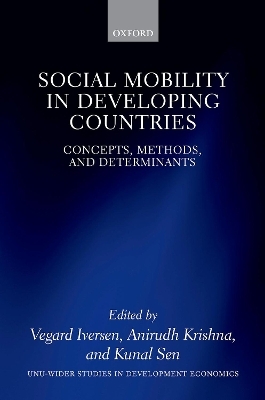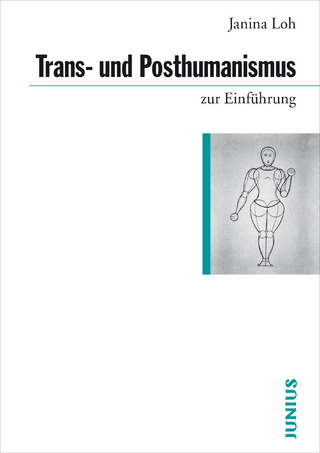
Social Mobility in Developing Countries
Oxford University Press (Verlag)
978-0-19-289685-8 (ISBN)
Social mobility is the hope of economic development and the mantra of a good society. There are disagreements about what constitutes social mobility, but there is broad agreement that people should have roughly equal chances of success regardless of their economic status at birth. Concerns about rising inequality have engendered a renewed interest in social mobility--especially in the developing world. However, efforts to construct the databases and meet the standards required for conventional analyses of social mobility are at a preliminary stage and need to be complemented by innovative, conceptual, and methodological advances. If forms of mobility have slowed in the West, then we might be entering an age of rigid stratification with defined boundaries between the always-haves and the never-haves-which does not augur well for social stability.
Social mobility research is ongoing, with substantive findings in different disciplines--typically with researchers in isolation from each other. A key contribution of this book is the pulling together of the emerging streams of knowledge. Generating policy-relevant knowledge is a principal concern.
Three basic questions frame the study of diverse aspects of social mobility in the book. How to assess the extent of social mobility in a given development context when the datasets by conventional measurement techniques are unavailable? How to identify drivers and inhibitors of social mobility in particular developing country contexts? How to acquire the knowledge required to design interventions to raise social mobility, either by increasing upward mobility or by lowering downward mobility?
Vegard Iversen is Professor of Development Economics and Head of the Livelihoods and Institutions Department, Natural Resources Institute (NRI), University of Greenwich. After completing his PhD in development economics from University of Cambridge in 2000, he was tenured faculty at School of Development Studies, University of East Anglia until he moved to India in 2006. While living and working in India he was a Research Fellow in IFPRI's New Delhi office, a visiting faculty member at Indian Statistical Institute (Delhi), a Professor and Vice Dean at Jindal School of Government and Public Policy, an Adjunct Professor at Sanford School of Public Policy's Duke Semester in India programme and a Professor in the Economics Area, Indian Institute of Management Ahmedabad. He received the Annual Dudley Seers Memorial Prize for the best article in Journal of Development Studies in 2008 and has served on the journal's editorial board since 2016. Anirudh Krishna is the Edgar T. Thompson Professor of Public Policy and Political Science at Duke University. He received his PhD in government from Cornell University in 2000, and a Master's in economics from Delhi University in 1980. Professor Krishna's research investigates how poor communities and individuals in developing countries cope with the structural and personal constraints that result in poverty and powerlessness. Before returning to academia in 2000, he spent 14 years with the Indian Administrative Service, managing diverse rural and urban development initiatives. He received an honorary doctorate from Uppsala University in 2011; the Olaf Palme Visiting Professorship from the Swedish Research Council in 2007; the Dudley Seers Memorial Prize in 2005 and 2013; and a best article award of the American Political Science Association in 2002. Kunal Sen has over three decades of experience in academic and applied development economics research. He is the author of eight books and the editor of five volumes on the economics and political economy of development. He is Director of UNU-WIDER in Helsinki, and is a Professor of development economics at the Global Development Institute, University of Manchester. Professor Sen is a leading international expert on the political economy of growth and development. He has performed extensive research on international finance, the political economy determinants of inclusive growth, the dynamics of poverty, social exclusion, female labour force participation, and the informal sector in developing economies. His research has focused on India, East Asia, and sub-Saharan Africa. He was awarded the Sanjaya Lall Prize in 2006 and the Dudley Seers Prize in 2003 for his publications.
PART I. INTRODUCTION
1: Vegard Iversen, Anirudh Krishna, and Kunal Sen: The state of knowledge about social mobility in the developing world
PART II: THEORY AND CONCEPTS
2: Patrizio Piraino: Drivers of mobility in the Global South
3: Gary Fields: Exploring concepts of social mobility
4: Vegard Iversen: Social mobility in developing countries: Measurement and downward mobility pitfalls
5: Ravi Kanbur: In praise of snapshots
PART III: TYPES OF MOBILITY
6: Himanshu and Peter Lanjouw: Income mobility in the developing world: Recent approaches and evidence
7: Florencia Torche: Educational mobility in the developing world
8: Anthony Heath and Yizhang Zhao: Rethinking occupational mobility in developing countries: Conceptual issues and empirical findings
PART IV: DIALOGUE ON MEASUREMENT AND METHODS
9: M. Shahe Emran and Forhad Shilpi: Economic approach to intergenerational mobility: Measures, methods, and challenges in developing countries
10: Yaojun Li: Social mobility in China: A case study of social mobility research in the Global South
11: Divya Vaid: Ethnography and social mobility: A review
12: Gregory Clark: Measuring social mobility in historic and less developed societies
PART V: DRIVERS AND INHIBITORS
13: Jere Behrman: Social mobility and human capital in low- and middle-income countries
14: Anirudh Krishna and Emily Rains: Informalities, volatility, and precarious social mobility in urban slums
15: Nancy Luke: Gender and social mobility: Exploring gender attitudes and women's labour force participation
16: Patricia Funjika and Rachel M. Gisselquist: Social mobility and horizontal inequality
17: Anandi Mani and Emma Riley: Social networks as levers of mobility
PART VI: CONCLUSIONS
18: Vegard Iversen, Anirudh Krishna, and Kunal Sen: Social mobility in developing countries: Directions for research practice, knowledge gaps and policy support
| Erscheinungsdatum | 22.12.2021 |
|---|---|
| Reihe/Serie | WIDER Studies in Development Economics |
| Zusatzinfo | 32 Figures, 40 Tables |
| Verlagsort | Oxford |
| Sprache | englisch |
| Maße | 162 x 240 mm |
| Gewicht | 914 g |
| Themenwelt | Sozialwissenschaften ► Soziologie |
| Wirtschaft ► Volkswirtschaftslehre | |
| ISBN-10 | 0-19-289685-7 / 0192896857 |
| ISBN-13 | 978-0-19-289685-8 / 9780192896858 |
| Zustand | Neuware |
| Haben Sie eine Frage zum Produkt? |
aus dem Bereich


